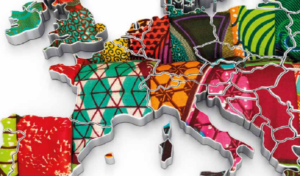
ENAR
Afrophobia is an ongoing and widespread problem in Europe, with Black people experiencing racial discrimination in education, employment, health, policing and the criminal justice system, according to a new report.
The survey, Afrophobia in Europe, prepared by the Brussels-based European Network Against Racism, asked people of African descent and Black Europeans about their experiences with racism and discrimination in daily life. According to ENAR, the anti-migrant rhetoric in the European Union has resulted in a shift toward less support for anti-racism issues.
“Political discourse, that is racist and Islamophobic, is predominantly framed in the context of anti-immigration and targets migrants that are both Black and Muslim (Bulgaria, Estonia, Finland, Germany, the Netherlands, Spain),” says the report. “As a result Black migrants, refugees, asylum seekers and Black Europeans are reportedly suffering an increase in violent hatred and discrimination across all areas of life.”
Further, although the EU has racial equality legislation, there is no EU policy to combat racial discrimination against people of African descent. And while most EU member nations have policies to address racism, Black people are reportedly not included in the plan. Further, most nations report dwindling resources for combating racism, meaning that Black people will continue to be over-represented in the various measures of racial inequality.
In what would sound like a familiar story to people in other parts of the African diaspora, Europe is rife with discrimination, with Black people with African-sounding names compelled to send out more job applications than those with European-sounding names just to secure an interview. People of African descent suffer from higher unemployment rates in Europe, and live under cramped conditions in older, poorer parts of a given city.
In addition, they face discrimination in the housing rental market, as real estate agents screen potential tenants and say that property owners and residents want to exclude Black people from their neighborhoods. Further, Black people suffer from poorer health in many European states, and are refused treatment. Racism negatively affects the health of Black people, especially mental health in nations such as Germany, the Netherlands and the UK. Racism also impacts the education of Black children, who face racist bullying and segregation, and under-evaluation and racist teaching methods and materials from their teachers.
The report also notes that Black people suffer from police violence and violence and racial abuse from the general public. Racial profiling and a failure to investigate racially motivated crimes has created a lack of trust between communities of African descent and law enforcement, who in some cases exhibit openly racist behavior and operate institutionally racist agencies.
And in the media, Black people are portrayed as entertainers, criminals or undocumented immigrants, and the N-word is used in Austria, Bulgaria, Estonia, Germany, the Netherlands, Sweden and the UK.
Moreover, the actual size of Europe’s Black population is uncertain, as there is virtually no data collection on racial equality in Europe.
“Black people born in Europe and with a citizenship of a European country disappear from sight when looking at the most common demographics and statistics such as population size, unemployment rates and educational attainment,” according to the report.
“There is not a single national or European policy that specifically addresses the racial inequalities and discrimination experienced by Black people,” said ENAR Chair Sarah Isal. “Given the overwhelming evidence, this is shocking. We cannot just ignore the lives of the 12 million Black people in Europe. This is a wake-up call to the EU and its member states to end structural discrimination against Black people. We need an EU Framework for national strategies to combat Afrophobia and promote the inclusion of people of African descent, with clear targets and indicators.”
However, ENAR does recommend solutions. For example, the report says EU policymakers and institutions must acknowledge the devastating impact of racism on people of African descent and Black Europeans and adopt strategies and policy objectives to fight Afrophobia and promote the inclusion of Black people. Examples of possible solutions include mandating an end to racial profiling; media literacy; data collection and research on Afrophobia to inform decision making; increased funding for minority-led organizations servicing Black communities; publishing the ethnicity of hate crime victims; instituting anti-racism policies in the schools, and developing guidelines for inclusion and opportunity in the workplace.


